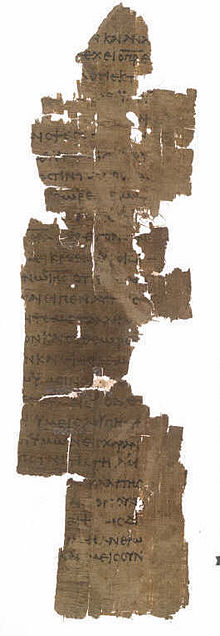Papyrus 5
Papyrus 5
| nom | Papyrus Oxyrhynchus 208 + 1781 |
|---|---|
| texte | Évangile selon Jean † |
| langue | Grec ancien |
| date | IIIe siècle |
| trouvé | 1889 |
| maintenant à | British Library |
| dimension | 12,5 c 25 cm |
| type | Texte occidental |
| Catégorie | I |
Le Papyrus 5 (5) est une copie du Nouveau Testament en grec, réalisée sur un rouleau de papyrus au IIIe siècle[1].
Le texte s'agit de l'Évangile selon Jean (1,23-31.33-40; 16,14-30; 20,11-17.19-20.22-25)[2].
Le texte est de type occidental. Kurt Aland le classe en Catégorie I[1].
5 a été découvert en Oxyrhynque[2]. Il est actuellement conservé à la British Library (Inv. nos. 782, 2484)[1],[3].
Voir aussi[modifier | modifier le code]
Références[modifier | modifier le code]
- Kurt Aland, and Barbara Aland, The Text of the New Testament: An Introduction to the Critical Editions and to the Theory and Practice of Modern Textual Criticism, trad. Erroll F. Rhodes, William B. Eerdmans Publishing Company, Grand Rapids, Michigan, 1995, p. 96.
- Philip W. Comfort, David P. Barrett, The Text of the Earliest New Testament Greek Manuscripts, Tyndale House Publishers, Wheaton 1999, p. 43.
- « Liste Handschriften », sur Münster Institute, Institute for New Testament Textual Research (consulté le )
Bibliographie[modifier | modifier le code]
- B. P. Grenfell & A. S. Hunt, Oxyrhynchus Papyri II, (London, 1899), pp. 1-8.
- B. P. Grenfell & A. S. Hunt, Oxyrhynchus Papyri XV, (London, 1922), pp. 8-12.
- C. R. Gregory, "Textkritik des Neuen Testaments", Leipzig 1909, vol. 3, p. 1085.
- C. R. Gregory, Die griechischen Handschriften des Neuen Testament, p. 45.
- Philip W. Comfort and David P. Barrett. The Text of the Earliest New Testament Greek Manuscripts. Wheaton, Illinois: Tyndale House Publishers Incorporated, 2001, pp. 73-78.


